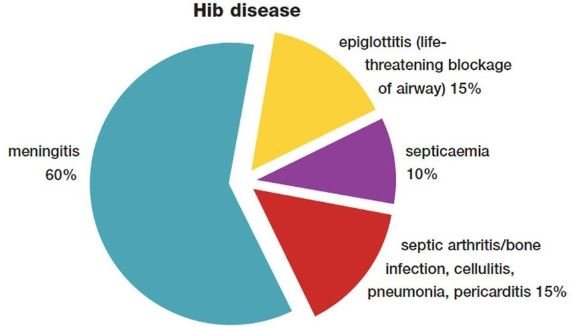What is Hib Vaccine?
Before Hib vaccine was developed, approximately 20,000 children within the United States aged under 5 years where infected with Hib disease every year of which about 3 to 6 percent died2. Since 1991 the immunization of children with Hib vaccine has reduced the infections by almost 99 percent. Hib disease can be prevented by use of two vaccines which are Hib vaccine and DTaP-IPV/Hib vaccine. The former protect both children and adult from the said Hib disease while the latter protect babies aged between 2 to 18 months from not only Hib disease but also other disease like polio, diphtheria, tetanus, and whooping cough.

What’s Hib Disease?
Haemophilus Influenzae type B, which is commonly referred to as Hib is a type of bacteria that results in severe infection among children. Although the name features the word ‘influenzae’, the infection isn’t related to influenza virus. However, the name came about after a group of patients were found to have Hib during the 1892 influenza outbreak before scientists ascertained that the flu was actually due to a virus.
Hib disease is a collective term that applies to infections caused by Hib bacteria. Although it is at times mentioned that Haemophilus influenzae type B helps protect against Hib, that’s a wrong phrasing and it’s not technically correct because the vaccine offers protection against a wide range of diseases or infections caused by Hib including septic arthritis that infects the joints, epiglottitis that infects the epiglottis, cellulitis that infects the skin, pneumonia, and meningitis.5
Hib disease is an umbrella term used to imply diseases or infections that arise from a bacterial infection of the Haemophilus Influenzae Type B. Hib disease affects children who are aged 5 years and below, however adults who have certain health conditions may be more susceptible to having Hib disease. Individuals said to be ‘carriers’ of the disease may get it but they don’t develop symptoms, or become sick.
Other people may develop the disease and have serious infections affecting many parts of their body, for example:1,2
- Bacteremia, a condition in which bacteria enters the blood stream
- Meningitis, which refers to an inflammation within the lining tissue of the spinal cord and the brain
- Pneumonia, an infection that affects the lungs
- Epiglottitis, an infection of the throat
- Infections of the joints and bones or lining of an individual’s heart.
When you suffer from the above infections, the complications can be so serious. Hib meningitis for example, can cause damage to the brain or bring about hearing loss among 1 in every 5 children that endure it. Haemophilus influenzae type B isn’t able to survive in the environment or on surfaces. The only known reservoir for it to survive is humans, and they can carry the bacteria without becoming ill5.
Children get Hib disease by coming in contact with droplets in the air. For instance, a person having the bacteria may sneeze or cough and disperse them into the air. When you breathe in the air contaminated with the bacteria, you can suffer from Hib disease. A child may be able to contract Hib disease when they get around with other children or even adults having the bacteria.
Mainly the germs are spread from an individual to another, and when they remain in the throat or nose, a child may not become sick. However, when the microbes spread to enter the bloodstream or lungs, then serious complications occur as a result of Hib disease. When this is the case, it is referred to as invasive Hib disease. In the United States, Hib disease was reported as the main cause of bacterial meningitis within children who are below the age of 5 years before the vaccine was developed.
Why Children Should Get Hib Vaccine?
Infants and children who get Hib disease may develop very serious complications. It can cause damage to major organs like lungs, brain, ears, and other parts meaning that it is a deadly disease. The aim of administering Hib vaccine is to protect children from getting Hib disease.1,2
Children and adults who are immunized by getting the Hib vaccine have protection against diseases such as Hib meningitis, pericarditis, pneumonia, and infection of the bones, joints, and blood by bacteria.

Who Should Get Hib Vaccine?
Children and infants are required to have Hib vaccine as one of the vaccines in their routine immunization schedule. The children or infants can have 3 or 4 doses of the vaccine depending on the brand. The first dose is administered at the age of 2 months and the second dose comes at the age of 4 months. A child will get the third dose at the age of 6 months. Additional dose, also known as booster dose comes in at the age between 12 to 15 months.1,2
In people who have attained the age of 5 years and above, they may not need to get Hib vaccine, however, a doctor may recommend it if an individual has certain health conditions that make him or her susceptible to suffering from Hib disease. You may need to have Hib vaccine if you are older than 5 years and you have had bone marrow transplantation or you have sickle cell disease or damaged spleen that requires surgery to remove it. It is important that the family talks to their doctor on how they can protect themselves from Hib disease.1,2
Who Cannot Get Hib Vaccine?
There are some people who may not be a good candidate for Hib vaccine administration and they include:1,2,3,4
- Infants aged less than 6 weeks
- Individuals with serious allergy reaction to any ingredient used in making the vaccine
- People who have previously showed serious, life-threatening reactions or allergy (anaphylaxis) to the vaccine. It is important that you talk to the physician about any allergy you have prior to being administered the vaccine.
- People who are serious or moderately sick may have to wait until they feel better before they get the vaccine. However, those mildly sick may still have Hib vaccine. Minor illnesses like colds should not prevent a child from having the immunization.
Is Hib Vaccine Safe?
It is safe to have Hib vaccine, however, like many other vaccines, side effects can occur and they include:
- Swelling of the injected area
- Soreness or redness within the area of injection
- Fever.
No serious side effects are reported, however, severe allergic reactions can occur, but rarely. It is also considered to be safe for a child to get the vaccine along with other vaccines or have a combination vaccine.
What Should You do If Your Child Misses a Dose?
If for any reason you find that a child has missed a dose, it is important that you get a catch-up shot, usually administered during your next visit to a doctor. In most cases, you don’t need to begin the dose all over again6. Remember that when you don’t immunize your child against Hib disease, he or she may become sick and get serious infections.
In a six-month duration that started in October 2008, about seven cases involving invasive Hib disease occurred in Pennsylvania. It was found that out of those seven cases, only one child had been give Hib vaccine, and the child has actually received a single dose of the recommended three or four. Out of the seven children, three died5. So, this shows how serious Hib disease can be if a child is not immunized.
Reference List
- Hib (Haemophilus Influenzae Type B). https://www.vaccines.gov/diseases/hib/index.html
- Haemophilus influenzae type b (Hib) Vaccine. https://medlineplus.gov/druginfo/meds/a607015.html
- Haemophilus Influenzae Type b (Hib) VIS. https://www.cdc.gov/vaccines/hcp/vis/vis-statements/hib.html
- What Is Hib? https://kidshealth.org/en/parents/hib-vaccine.html
- Haemophilus influenzae type b (Hib). https://www.historyofvaccines.org/content/articles/haemophilus-influenzae-type-b-hib
- Hib (H. influenzae Type B) Vaccine. https://www.webmd.com/children/vaccines/hib-h-influenzae-type-b-vaccine#1
- Haemophilus influenzae type b (Hib). http://www.who.int/biologicals/areas/vaccines/haemophilus/haemophilus_influenzae_typeb_Hib/en/
